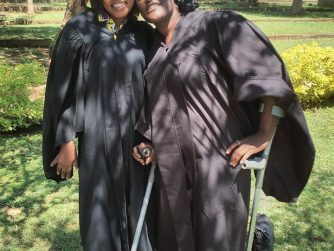“Politics is a virtual male monopoly in many countries; progressive movement would aim toward gender balance.”
In its usual and even democratic forms, politics is an alien and alienating world to most women, not because it is too abstract or too complicated, but because it is often perceived as destructively competitive, morally compromising and hostile to those women who do try to enter it through the conventional channels. Part of the desire that women have to remain autonomous is to distance themselves from the corrupting pressures and the competitive power plays that they believe will divert them from their goals.
In these times when political transitions and attempts to achieve Inclusive and sustainable development are in the spotlight, the role of women and their participation, or lack of such, in political processes is much debated. However, the absence of women in decision-making during political transitions cannot be underestimated, regardless of the situation of women in ancient days; women are not in places where decisions concerning their lives and futures are made. It is a major challenge to uncover and address the universal structured pattern of unequal power distribution between women and men that keeps women in a subordinated position and consequently exclude them from the decision-making processes.
 There is often the question: What difference do women make? We see the issue of women’s participation in the decision-making spheres as an issue based on social and gender justice, not on ‘efficiency’. In other words, the presence of women can’t be measurable in terms of impact: it is a measure of democracy. In this regard, there is a persistent gender gap in the planning of both political and transitional processes that removes societies out of conflicts and dictatorships. Political processes, are building upon a combination of a specific patriarchal legacy of society and universal traditional patriarchal values. This combination results in different forms of production or reproduction of under-representation of women in political leadership. Therefore, women’s proactive participation for social change or keeping the community going does not automatically translate into their proportional participation in decision-making processes usually exercised in political leadership.
There is often the question: What difference do women make? We see the issue of women’s participation in the decision-making spheres as an issue based on social and gender justice, not on ‘efficiency’. In other words, the presence of women can’t be measurable in terms of impact: it is a measure of democracy. In this regard, there is a persistent gender gap in the planning of both political and transitional processes that removes societies out of conflicts and dictatorships. Political processes, are building upon a combination of a specific patriarchal legacy of society and universal traditional patriarchal values. This combination results in different forms of production or reproduction of under-representation of women in political leadership. Therefore, women’s proactive participation for social change or keeping the community going does not automatically translate into their proportional participation in decision-making processes usually exercised in political leadership.
Moreover, the political sphere is a male dominated sphere where women are easily invited to limit their action to ‘women’s questions’, even if women are as specific as men. As their numbers are very limited, it is very difficult to impose issues connected with women’s’ rights and gender equality on the negotiation agenda. Also very important is the political will, or lack of such, to address effectively strong gender stereotypical images of women: a so-called feminine identity characterized by a ‘lack of taste or inaptitude to deal with power’ and inability for tough negotiations. This ‘womanhood’ is a historical fabrication, the direct consequence of which is the exclusion of women from political life. Achieving gender balance in the decision-making sphere requires global changes in public attitudes to build societies where women and men are of equal worth.
This means that gender equality should be adopted urgently as a priority on political, economic and social agendas. Without it, no advancement of any rights can be achieved, as political leadership and governance and sacrifice of rights, in particular women’s rights, in the name of national security, will remain dominant. Common actions between political decision-makers and women’s rights organizations in the field of power and democracy, secularism, violence against women, peace and security have to be structured by a common will to promote the role of women and their equal participation in decision-making processes, not only as a matter of democracy but also as a condition for sustainable development.
Kenya has come a long way with issues of equitable gender representation in political, economic and social spheres. Since her independence in the year 1963 women have been seeking to effectively participate alongside men in governance and decision making. The deeply rooted patriarchal socio cultural values, undemocratic institutions and low levels of civic and gender awareness have highly contributed to the long struggle to achieve gender equity. According to the world economic forum global gender gap report of year 2014 Kenya was ranked position 37 with a score of 0.7258.There has been continuous gender activism, gender sensitization, capacity building programs for women political leaders and constitutional reforms aimed at scaling up gender equity.
The promulgation of the constitution of Kenya in the year 2010 saw an achievement in terms of gender equality through the provision for affirmative action in article 27(6) which states that “To give full effect to the realization of the rights guaranteed under this Article, the State shall take legislative and other measures, including affirmative action programmes and policies designed to redress any disadvantage suffered by individuals or groups because of past discrimination.” Article 81 (b) of the Constitution of Kenya which refers to the general principles of Kenya’s electoral system states ‘the electoral system shall comply with the following principle – (b) not more than two-thirds of the members of elective public bodies shall be of the same gender. Despite Article 177 ensuring that Articles 81(b) and 27 (8) of the Constitution of Kenya are complied with at the County level through the nomination of special seat members, the same is not guaranteed at the National Assembly and the Senate.
Despite these affirmative action measures, women participation in the 2013 general elections in Kenya remained very low. There were 19 women candidates for senatorial and gubernatorial positions (out of 237 candidates). As a result, no women were elected as senator or governor. Out of the 290 elected National Assembly members, just 5.5 percent are women. For the 1,450 ward representatives positions only 88 (6 percent) of the elected candidates were women. Political representation of Kenyan women now stands at 15 percent versus Rwanda’s 56 percent, South Africa’s 42 percent, Tanzania’s 36 percent and Uganda’s 35 percent. Kenya’s 15 percent is an improvement from the previous 9.8 percent representation in the 10th Parliament and the increased numbers can be greatly attributed to the reserved seats for the 47 Women Representatives. Although the current representation is the highest level so far of women political leadership in Kenya, it is still very poor showing in this day and age where women’s political participation has generally improved around the world.
Following the Attorney General’s request for an advisory opinion on the minimum one-third gender requirement in the National Assembly and the Senate, the Supreme Court of Kenya on 11th December, 2012 held that gender equity as an affirmative action right for women is progressive in nature and not an immediate realization. The Court gave Parliament up to August 27, 2015 to come up with legislation on how the one-third gender rule will be met in the 2017 General Election.
Constitutional gender quotas have proved to be a critical and effective way of enhancing women’s participation and representation in political life. Countries such as Rwanda, South Africa, Tanzania and Uganda have made commendable progress in enhancing women’s representation by use of constitutional gender quotas.
The deadline provided by the supreme court of 27th August 2015 came and passed without legislation on the implementation of the two third gender principle in Kenya. Kenyans have to wait a little bit longer to realize the two third gender principle.
In terms of the intersection between gender and disability, the situation is worse. Women with disabilities are underrepresented in the elective and appointive positions, not so much attention is paid when it comes to their inclusion in politics and governance. When affirmative action is being discussed in the boardrooms, women with disabilities consistently miss out and no one tends to think that both gender and disability are development issues and need to be addressed concurrently. For instance in the 2013 general election no woman with disability was elected as member of parliament or senator and only one was nominated as an MP and one appointed as principal secretary .The participation of this group in the decision making table is too low and this has led to their exclusion in mainstream development.
There is a permanent assumption that women are meant to run the domestic chores, and the fact that they do well in decision making at family levels has not at all brought to the acceptance of the society the power within them in influencing change and also progress/development.
It is still a matter that needs a lot of paradigm shift and attitudinal change why women have to “fight” to be recognized or even be included in decision making. It is unclear why we automatically have the male in mind when it comes to taking up the leadership positions especially in the political field.
We need to ensure that the African culture is “redefined” when it comes to political representation and participation by women, there are a lot of cases of intimidation of women who have interests in politics, and when we look deeply, we find that there are cultural attachments to the claims e.g. marital status of a woman has for a long time been a topic of discussion when it comes to leadership ability.
It is high time we should have policies that are beyond paperwork when it comes to women taking up political positions; women are just a different sex but not a weaker sex as we have been made to believe all along.
Empowering the woman to take up political positions has a lot above the mere setting aside of nominations meant for women, it has a lot to do with setting aside resources for them to use in order to equally “fight” for the positions.
The eternal mentioning of women representation as a matter of dire need to be addressed is the first way of making women to feel and accept the assumption that they are weak hence in need of a stronger person to hold their hands up the political ladder.
The best way and approach is to have an open floor and availability of resources as well machineries needed in such occasions, this should be done with one thing in mind-women may be in need of financial support to take part in such positions but not in need of sympathy to be seen among men in politics.
In conclusion, I strongly believe that legislation should be backed with attitudinal changes and removal of socio-cultural barriers that hinder effective participation of women in political leadership and governance. Legislation alone cannot realize equitable gender representation. As a country we need to move away from retrogressive practices which are part of our traditions.
I therefore fully echo the sentiments of the president of the United States of America during his official state visit to Kenya on 26th July 2015 by quoting “These are issues of right and wrong — in any culture. But they’re also issues of success and failure. Any nation that fails to educate its girls or employ its women and allowing them to maximize their potential is doomed to fall behind in a global economy”.







I like this website it’s a master piece! Glad I detected this ohttps://69v.topn google.Raise your business
Your article helped me a lot, is there any more related content? Thanks!
Your article helped me a lot, is there any more related content? Thanks!
Thanks for sharing. I read many of your blog posts, cool, your blog is very good. https://accounts.binance.com/register?ref=P9L9FQKY
canadian mail order pharmacy
http://expresscanadapharm.com/# canadian pharmacy ed medications
canadian pharmacy meds reviews
Impressed with their wide range of international medications.
where can i get cytotec without prescription
They provide peace of mind with their secure international deliveries.
They simplify the complexities of international prescriptions.
cost generic cytotec online
Trust and reliability on a global scale.
Their international patient care is impeccable.
where to buy clomid without rx
A name synonymous with international pharmaceutical trust.
A pharmacy that truly understands customer service.
gabapentin stroke risk
Their commitment to international standards is evident.
Your point of view caught my eye and was very interesting. Thanks. I have a question for you.
Your point of view caught my eye and was very interesting. Thanks. I have a question for you.
I don’t think the title of your article matches the content lol. Just kidding, mainly because I had some doubts after reading the article. https://accounts.binance.com/hu/register?ref=FIHEGIZ8
I don’t think the title of your article matches the content lol. Just kidding, mainly because I had some doubts after reading the article.
Thank you for your sharing. I am worried that I lack creative ideas. It is your article that makes me full of hope. Thank you. But, I have a question, can you help me?
Can you be more specific about the content of your article? After reading it, I still have some doubts. Hope you can help me.